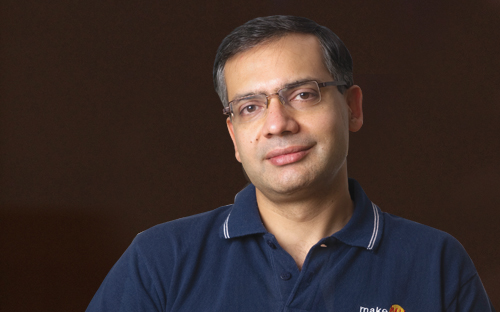Deep Kalra is the founder and CEO of India’s leading online travel company MakeMyTrip.com. Founded in 2000, the company is now the largest e-commerce business in the country and listed its shares on NASDAQ in August 2010. Prior to founding MakeMyTrip.com, Mr. Kalra has had corporate stints with GE Capital, AMF Bowling Inc. and ABN AMRO Bank. He holds an MBA (PGDM) degree from IIM, Ahmedabad and a Bachelor’s degree in Economics from St. Stephen’s College, Delhi.
Read on to find out about the true test of an entrepreneur, the importance of knowing dhanda at a startup and going against common sense.
[Innovate Delhi] You believe in turning what one loves doing into a business model. How did you figure out what you love and turned that into India’s leading online travel company?
 [Deep Kalra] For all entrepreneurs you have to focus on something that you love. But it definitely took me three jobs to figure out what I loved – I worked in banking, I worked in a very entrepreneurial role at AMF Bowling and I worked for GE Capital. Between these three roles, I figured out that I enjoyed the untrodden path. I was excited by stuff that had not been done before or at least not been done before in this part of the world. My second role was very entrepreneurial and I enjoyed that the most despite the fact that it was not financially a success. But I really had the time of my life which made me realize that I rather be doing my own thing.
[Deep Kalra] For all entrepreneurs you have to focus on something that you love. But it definitely took me three jobs to figure out what I loved – I worked in banking, I worked in a very entrepreneurial role at AMF Bowling and I worked for GE Capital. Between these three roles, I figured out that I enjoyed the untrodden path. I was excited by stuff that had not been done before or at least not been done before in this part of the world. My second role was very entrepreneurial and I enjoyed that the most despite the fact that it was not financially a success. But I really had the time of my life which made me realize that I rather be doing my own thing.
What did the failure at AMF bowling teach you? How important do you think failure is in an entrepreneur’s journey?
AMF Bowling was a game changer in my own mind in terms of approaching different problems. Here was a problem that had not been thought about – How do you sell a family entertainment center around bowling which had not existed before? Addressing this problem was a learning curve in doing dhandha which is different from corporate business. Overall, it was a good learning experience in terms of a start up and solving problems that had not been solved before. It was also very personally fulfilling to me and I didn’t want to give it up. In hindsight, common sense would have dictated that I called quits within a couple of years but I worked with AMF Bowling for four years. So it also taught me that I can keep my head and chin up during a period when things are not working.
How is doing dhanda a unique challenge in itself? I read that you have bribed repairmen with bottles of rum to fix rat chewed cables. What challenges does the Indian entrepreneurial space pose and how do you deal with them while ensuring that you don’t lose sight of your larger goals?
I didn’t make a habit of bribing repairmen with alcohol but did so some unconventional stuff! The important lesson is that in the first many many years an entrepreneur should be ready to do anything and everything. And a lot of people are not. It’s better to start your entrepreneurial journey earlier than later because you have lesser hangups. At the same time, there is something to be said about good work experience. I don’t know what is a good amount. For me it was 8 years. But some entrepreneurs have never worked for someone else. I would recommend, especially in the Indian context, to work for a couple of years in a good company. It will help you later in life- you want to hire good people, you want to keep them motivated, you want to do the right things. I don’t think any amount of education prepares you for those kind of decisions.
In the initial years, an entrepreneur spends most of the time doing non-core business because you don’t have a team. And in India, things take longer. But hopefully with more interest and infrastructure in this space, the processes will get shorter. For instance, its getting easier to hire good talent. A startup is no longer a very unusual career. As an entrepreneur you have to be an excellent seller because you are selling all the time. Even if you are not doing the traditional selling of your product, in the early stage you are selling to get good talent. You are selling your story, your company all the time. You have to convince people to give up their great job at GE Capital or a think tank or Unilever etc to join one’s company. And then you need to sell to raise money. Each time you go out to meet current investors and potential investors, you are selling without realizing. And you have to work harder to sell your story in India because there are fewer startup success stories here.
You have clearly done a great job of selling to potential hires, MakeMyTrip has consistently been ranked amongst the the Top 10 “Great Places to Work for in India” by The Economic Times in the last four years. What is the culture at MakeMyTrip that make it such a great place to work?
The culture at an organization is related to the founding team or founder. One of the titles that the founder carries through life is Head of Culture. The founder has to walk the talk. I think it really comes down to passion and personal values of the founding team. Because then you end up hiring people for values. Then you start percolating down those values among similar minded people into a “culture” or whatever you want to call it. Over time it becomes established and you can talk about it.
In your corporate and entrepreneurial journey, how do you think the Indian entrepreneurial space has evolved and what are the most promising trends today?
There has been tremendous change in the last 3-4 years. The quality of entrepreneurs is improving. People have a much better overall view of what they want to do and what they need. There are lesser and lesser people who want to do something that’s cool. So folks are coming in for the right reasons. I love that there has been a great increase in the amount of angel funding that is available but there is big gap between angel and early and Series A and Series D deals. You can get your first round of capital fairly easily if you are an individual with a good plan but you have to be ready to perform in the next 12 months to get your Series A.
Do you think entrepreneurship can be taught or are entrepreneurs born?
I think its largely inherent. When things are going well, anyone would rather work for themselves everything else be equal. But that is typically not the case. Everything else is not equal. Let’s say you are going to make 50% of the money. Then what is it that you really want to do. And I think that is the test for if you want to be an entrepreneur or not. And yes, entrepreneurship can be taught but I think entrepreneurship has to be learnt more than it can be taught. And you learn it on the job. Ultimately, if you are happy being on the job, everything will work out.
If you were a judge at Innovate Delhi, what would be the top three qualities you will look for in an entrepreneur?
Agility and flexibility is one. There is a fine line between stubbornness and resilience. You have to believe in your idea but also be practical enough to make changes as you go along. You have to be wired analytically. I don’t know of any other way to run business. Creativity is important but if you are not fundamentally analytical then you will end up making decisions that are sub-optimal. And the third one is being a very good people’s person. It goes back to culture and teambuilding and it is something that comes to entrepreneurs naturally.
This blog post was written by Sonal J Goyal for Innovate Delhi Entrepreneurship Academy. Innovate Delhi is a three-week long academy that works with aspiring entrepreneurs to hone their skills in innovation, team-building, and strategy. Applications are due on 1st February. Apply at http://www.innovatedelhi.com/apply/


